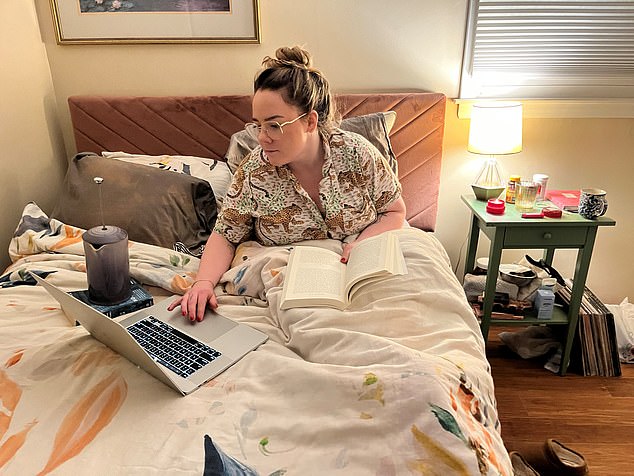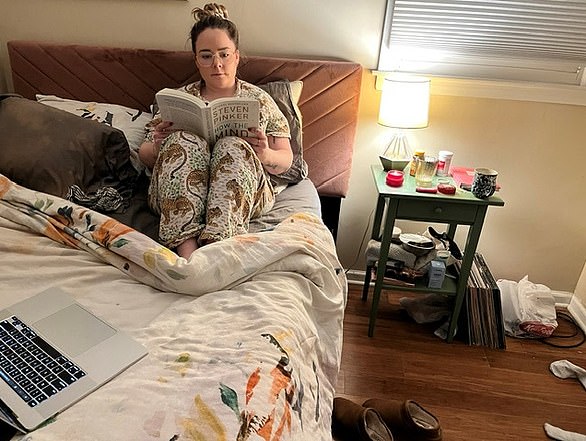Picture this: it’s a Saturday morning, the rain is pattering on the roof, the room is cool and the blankets are warm, there’s nothing on the agenda for the day. You declare the next 24 hours a ‘quilt day’.
Millions of TikTok users and those on other social media have in recent months touted the benefits and pleasures of a duvet day, or ‘bed rot’ – as many Tiktokers call it.
Clips posted with the phrase ‘bed rotting’ have been viewed more than 125 million times on TikTok.
The concept is simple; after a stressful week or few days, going to bed and engaging in nothing but self-care activities can offer the ultimate in relaxation.
Fans of the practice have said that a day of nothingness gave them better mental focus than they had experienced in months, and even noticed a renewed desire to be productive.
But psychologists are skeptical, and some are even worried.
People with a predisposition to depression could see their symptoms worsen after a day in bed, they say.
Laurel Roberts-Meese, a licensed marriage and family therapist told DailyMail.com that the trend could mask symptoms of clinical depression, believing it’s perfectly normal to spend days on end in bed and fail to seek help for their mental health problem.
Meanwhile, experts have also warned of exacerbating avoidance behavior by staying in bed all day cut off from the world.
Dr. Katrina Ostmeyer, psychologist and CEO at Beyond the individual, said: ‘Avoidance fuels anxiety and depression, and if you spend the day in bed avoiding your thoughts, feelings or problems, you’re really feeding those feelings and symptoms.
‘Furthermore, we miss opportunities to actively engage in life, which will be better for our mental and physical health.’
Some experts also claim that in our iPhone-obsessed world, a duvet day often turns into an opportunity for endless scrolling on social media – which several studies show can increase the risk of developing anxiety disorders and eating disorders.
However, the number of mental disorders in young people has increased by at least a third in the past decade and with limited resources to help them, it is no wonder that many invent their own remedies.
Dr. Gordon Flett, a psychologist at York University in Toronto, Canada who specializes in perfectionism, told DailyMail.com that while he doesn’t fully endorse the concept, he’s not surprised it’s so popular.
“The pressure to live up to today’s impossible expectations can be relentless,” he said. ‘So it’s not that hard to imagine a burnt out and exhausted perfectionist getting into this kind of state.’
So what’s the truth about the bed rotting trend – and should you try it when you’re feeling blue? DailyMail.com spoke to a number of leading psychologists to find out.
The term ‘bed rot’ alone is enough to trigger contempt among psychiatric professionals.
Ms Roberts-Meese told DailyMail.com: ‘I actually don’t think it captures the purpose of resting all day.
“Rotting sounds negative, I don’t really want people to feel like they have to rot to rest.”
She adds that the concept sends an insidious message that demonizes rest and instead makes the person feel less than able to give themselves a break.
‘I would be concerned that depressive behavior could be masquerading as fatigue because the two can feel very similar.’
Others have raised the concern of what is known as ‘functional freezing’, a mental, physical and emotional state where one is paralyzed by apathy. It often manifests as self-isolating, feeling numb and constantly feeling overwhelmed.
Liz Tenuto, who coaches people in stress relief exercise, said: “While there’s nothing wrong with lying in bed every now and then to recharge your batteries… doing this frequently, which is three times a week or more, is a sign that your nervous system is actively shutting down to protect you from experiencing more stress.’


Some cord advocates, like DailyMail.com’s Cassidy Morrison, use quilt days for some much-needed recharging rather than simply turning off the world.
But advocates say a quilt day isn’t just a marathon for nothing. It can involve reading, watching a comforting movie, journaling, coloring and light stretching.
The experts conclude that moderation is key. For example, just one quilt day a week is enough.
And it’s best to approach time spent horizontally with intention, says Ms. Roberts-Meese.
‘If you just wake up and you’re like, oh, I don’t really have anything planned. I think I’ll just stay in bed, I think you’re more likely to get worse.
‘I recommend that people be careful with their intake when they are in bed all day. It could be nutrients, food intake, making sure it’s nutritious in any way. And also what media you watch, something that really inspires you, or you learn, or you’re really comforted by it, that’s very different from mindless scrolling.


